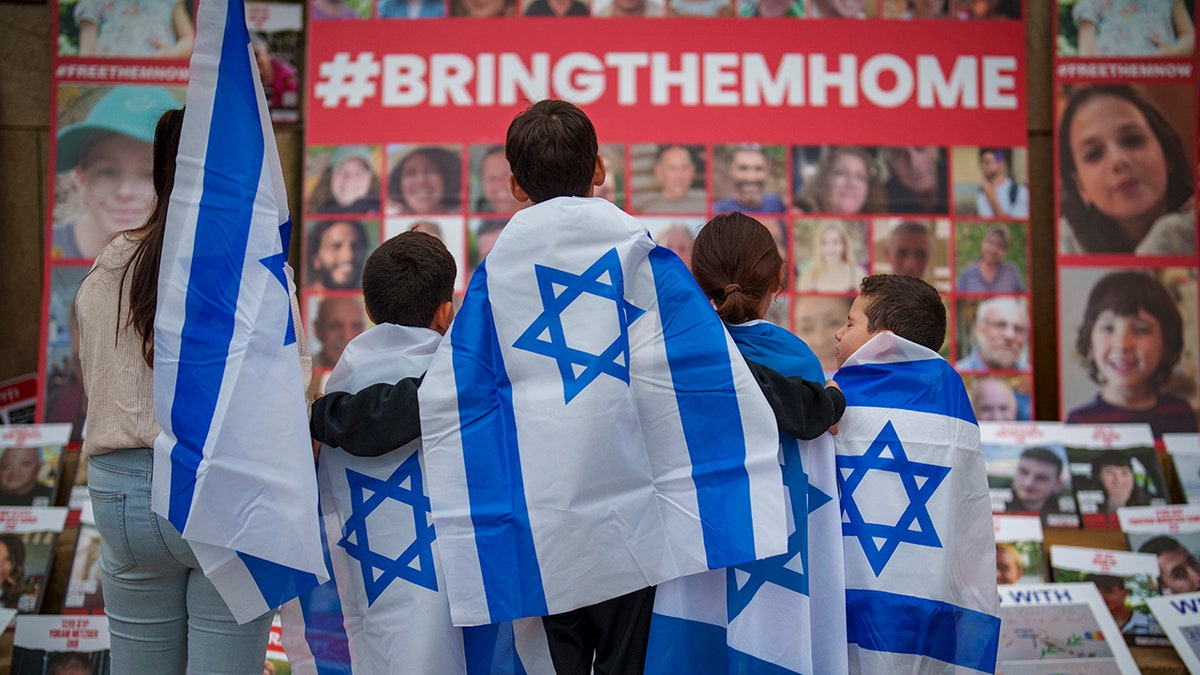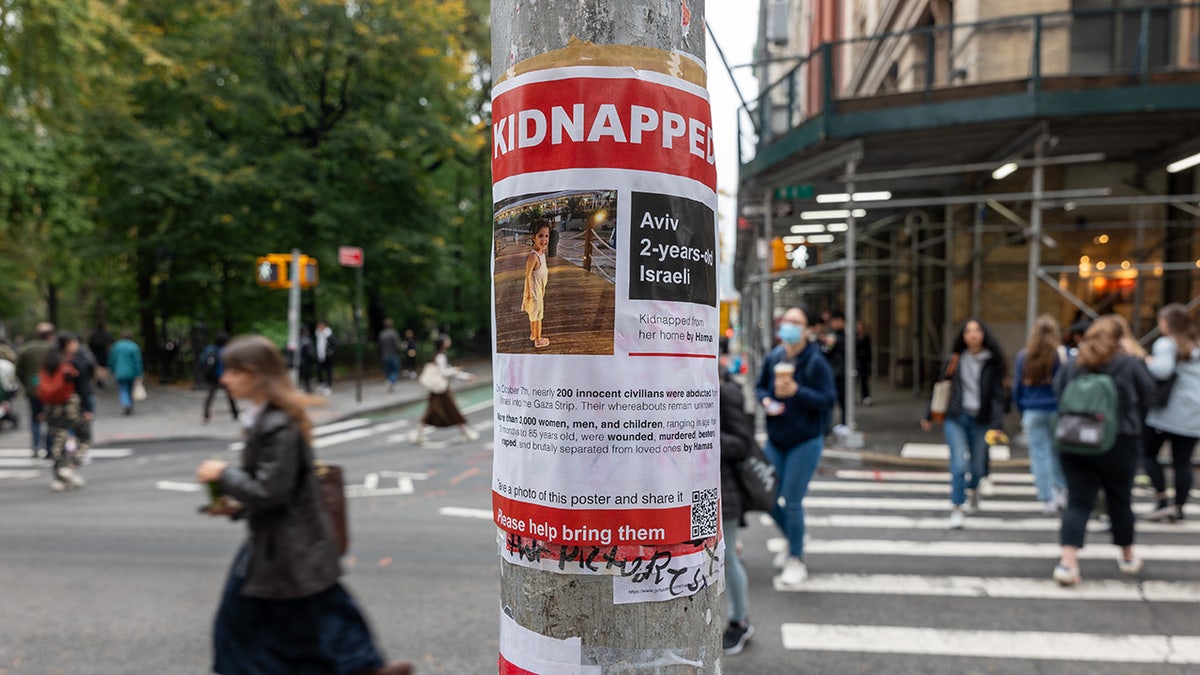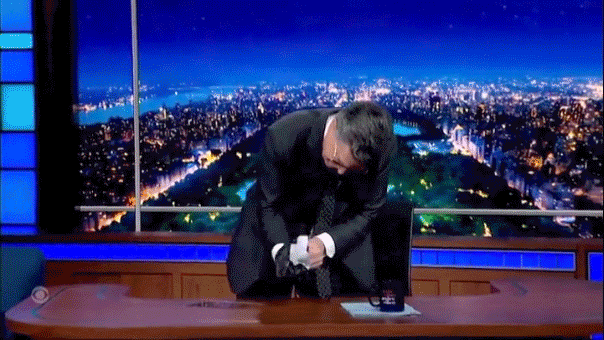Antisemitism is a 'driving force' in a lot of the pro-Palestinian activism going on, says Harvard student Jacob Miller
Harvard University student Jacob Miller discusses the rise of antisemitism on college campuses, the impact of the October 7 attack on his view of the university's administration and peers and the drop in early admission applications.
Since Hamas' October 7 terrorist attack on Israel, which left 1,200 Jews dead and resulted in the capture of over 240 civilians, there has been an uptick in antisemitic attacks and pro-Hamas protests across the United States, specifically on college campuses.
Among many younger Americans, there has also been an increasing number of claims in recent years that the Holocaust, during which Nazi Germany systematically murdered some six million Jews during World War II, didn't happen or was exaggerated. Jewish leaders and experts point to poor education of America's youth, in addition to social media platforms like TikTok, as part of the reason behind antisemitism and the false beliefs that the Holocaust is a myth.
Even before October 7, the Anti-Defamation League (ADL) conducted a study that found that despite rising antisemitism, Holocaust education remains an integral aspect of countering prejudice, despite the fact that such education is only currently mandated in 25 states.
"Antisemitism is no longer confined to extremist circles and has become increasingly mainstreamed, a major driver of which is social media and the online sphere," according to the study's findings. "In an era of rising antisemitism, coupled with the fading memory of the Holocaust, the relationship between Holocaust education and combating antisemitism has become even more critical to understand."
In 2020, a nationwide study found nearly one-quarter of younger Americans believed the Holocaust was a myth or exaggerated, and a recent spree of news reports show the attitude prevails.
ISRAELI UNIVERSITY PRESIDENT APPALLED BY AMERICAN COLLEGE PRESIDENTS' TESTIMONY ON ANTISEMITISM
Rabbi Abraham Cooper, who serves as associate dean and director of Global Social Action for the Simon Wiesenthal Center, told Fox News Digital that the uptick in Holocaust denialism is largely attributed to the fact that many young people have grown up in the digital age, which he said is rife with misinformation.
"We're now in an era where the last of the survivors of that era, the victims… they're leaving the world stage," he said. "We're now here in the 21st century and the generation of young people have grown up with the Internet and especially now with social media, as it advances, dominates more and more and more of our time."
"We look to our iPhones and iPads and everything else in between for entertainment, for communication, for information" and "part of the problem, the challenge is that there's no online librarian, there are no filters."
He pointed to TikTok as a huge reason why many young people believe the things they do.
"Many younger people no longer look at a newspaper," he said. "Whatever information they get about anything could be from TikTok or another social media… that's not very healthy for the future of any democracy or any society for that matter."
"That means that for those who are committed to denying history's greatest crime, the social media technology, the platforms are tailor-made for people [and] governments to put any information they want, manipulate information and data and make what obviously to maybe some of the older people in society, is patently false and dangerous, sound perfectly reasonable," he added. "That means Holocaust denial and distortion of the Holocaust."
JEWISH FEDERATION OF GREATER NASHVILLE CANCELS SUNDAY SERVICES, OTHER EVENTS DUE TO EMAIL THREAT
A TikTok spokesperson told Fox News Digital that the platform "stands firmly against antisemitism" and is "actively listening to the Jewish community and civil society as we work to strengthen our protections to stop the spread of hate."
"Our priority is keeping everyone in our community safe, and we've removed more than two million videos for hate speech since October 7th," the spokesperson added.
Gidon Lev, an 88-year-old Holocaust survivor who used TikTok to make sure younger generations don't forget the mass murder of Jews, left TikTok last month after he saw a flood of hateful comments and messages following the Oct. 7 Hamas attacks, which made him fear for his safety. Much of the bullying consisted of not just antisemitism, but Holocaust denial, USA Today reported.
Lev and his partner Julie Gray posted a farewell video titled "Just say no to Toxic TikTok," which called out the app for proliferating more harm than good.
"We have reached millions of young people on this app. It had its challenges and sometimes took quite a toll on both of us. But it’s also been wonderful. But increasingly over time and definitely now, it is clear that Bytedance/TikTok is causing a great deal of harm for all users and creators," Lev and Gray wrote in the video. "We can’t be part of something that causes more harm than good. So for the time being, for our collective well-being, we are taking our leave."
TikTok wrote in a November blog post that the content people see on TikTok is "generated by our community and recommendations are based on the content people have previously engaged with."
"TikTok does not ‘promote’ one side of an issue over another," the blog post said. "In the U.S., we have given our third-party Trusted Technology Provider access to TikTok source code to understand if the system is acting as TikTok intends."

Antisemitism is spiking across Europe after Hamas' Oct. 7 massacre and Israel's bombardment of Gaza. (AP Photo/Vadim Ghirda, File)
Cooper also said that when politicians on both sides of the aisle invoke comparisons of today's society to Nazi Germany or a politician to Hitler, it has an impact, "degrading the realities of what actually happened back in that era," so people get tired of hearing such rhetoric.
He said educators today are at a deficit since most of the survivors who provided testimonies of the horrors of Nazi Germany and the Holocaust have died.
"We're confronted today with a society where young people don't know the difference between good and evil, where facts matter less than feelings," he said. "When you have countries like Iran in which their official policy is to deny that the Holocaust ever happened, you have the full power of a government, it's cultural to promote the distortion of the Holocaust, denial of the Holocaust, [which is an] insult to the victims of the Holocaust."
Cooper said there can't be any assumption that the real truth and proper values will be transmitted to the next generation's children. Instead, he argued, society needs to do a better job of reaching the younger generations "at the nexus of where they absorb information," even if it's TikTok or another social media platform.
"We have to do a better job at education and we also have to have the right gatekeepers for education," he said. "We're finding that the people who run our most elite universities, many of them don't consider the concerns and the worries and the issues surrounding antisemitism and threats of genocide because it doesn't fit a narrative they're comfortable with. We see the price of that approach."

Posters of some of those kidnapped by Hamas in Israel are displayed on a pole outside of New York University (NYU) as tensions between supporters of Palestine and Israel increase on college campuses across the nation.
Adam Zimmerman, whose grandparents were both Holocaust survivors, now teaches 7th grade at a local Hebrew school in Maryland. He explained the importance of teaching American students about the Holocaust at a young age to prevent misinformed opinions.
"It's very disconcerting, to say the least," he said. "I think part of it stems from ignorance. I don't think we do enough teaching of the Holocaust and its aftermath in our schools today and I think that lack of learning and that lack of education… that's been happening for years now."
"When I teach, the first image I show my kids of my grandparents is a picture of them on their wedding day," he said. "It's not the picture that we have of my grandfather and his striped prison shirt with the Jewish star on it. It's a picture of a happy moment, of a joyful moment that they were able to create and find joy in their lives when they shouldn't have made it to their wedding day… and they lived wonderful and inspirational lives that we can still learn from."
From a personal perspective, he said any denial of his grandparents' story is a "slap in the face" to their lives, their experiences and what they went through during the Holocaust.
"My hope is as we're fighting back against the scourge of antisemitism, we're trying to connect the past to what's happening in the present," he said. "That's the full picture that's needed."
"We can't just treat this as a story that happened a very long time ago in a very far away place," he added.
In response to rising antisemitism and Holocaust denialism, Ron Halber, the executive director of the Jewish Community Relations Council of Greater Washington, explained that the further in time society gets from an event, the more difficult it is for society members to wrap their heads around it.
"It becomes increasingly the responsibility of educators to make sure that people realize that the Holocaust is not an historical footnote, but was a genocide perpetuated against the Jews of Europe and the world," he said. "We lost 6 million of the world's Jewish population in the worst genocide in history. "
Halber said he doesn't believe the United States does a good job of Holocaust education, which he said should be mandated in every high school in the United States.
"Not just like a 15-minute program, but it should be several hours of a course requiring trips to a Holocaust memorial, a local Holocaust museum, speaking with a survivor or watching tapes of those survivors who have passed on to truly understand the extent of the genocide," he said.

Protesters shout anti-Israeli slogans during a demonstration in Anaheim, Calif., on Jan. 4, 2009. (Jewel Samad/AFP via Getty Images)
"But I really believe that if America did a better job educating its youth about the Holocaust, we wouldn't have so many people who think it's a myth," he added.
Halber also emphasized the importance of learning about other episodes of U.S. history that are shameful, like the horrific conditions of slavery and WWII Japanese internment camps that were set up during World War II.
"A strong, confident nation doesn't fear sharing with its young people that mistakes were made," he said. "The old axiom... 'history is doomed to repeat itself,' well the only way you can stop negative things in history from repeating itself is to make sure people understand what happened and the consequences of those events."
He also pointed to social media, which he said "has become an incredible learning tool," which also gives people who believe in conspiracy theories a platform without proper educational measures in place.
"We have to attack the lack of civic education and knowledge of American history about genocide and make it a national mobilization priority the same way we would if we were facing a national emergency," he said. "We need to make sure that our young people understand about the civics of democracy, they understand about genocide, they understand there are certain basic historical elements and central tenets of American democracy," which currently "younger people aren't getting."










































